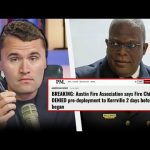In a significant recent development, the city of Chesapeake, Virginia, has made headlines by taking a strong stand against federal overreach by terminating the Bureau of Alcohol, Tobacco, Firearms and Explosives’ (ATF) access to its license plate reader system. This decision comes after an alarming revelation that the ATF had been scanning tens of thousands of license plates each year without local oversight or community consent. This situation illustrates a growing concern about privacy and government surveillance in America, particularly regarding law-abiding citizens who legally own firearms.
The issue began when a local news outlet submitted a public records request to Chesapeake, uncovering that the ATF had scanned over 40,000 license plates in just one year. Such surveillance was conducted without the knowledge of local government officials and was kept away from the eyes of the public. The lack of transparency and communication from the federal agency raised serious concerns, as it demonstrated a blatant disregard for citizens’ rights. Citizens should not face covert surveillance, particularly when they have not committed any crime.
In a powerful response, the Chesapeake City Council voted unanimously to revoke the ATF’s access to the city’s plate reader network. This decision was reached after residents expressed outrage, showing the power of community advocacy in holding government bodies accountable. This is an essential reminder that freedom and privacy are often upheld at the local level, where citizens can truly influence government actions.
Importantly, this decision transcended party lines, as council members from all political backgrounds recognized the overreach and potential dangers of such surveillance. They united to prioritize the citizens’ rights to privacy over unfettered access by federal agencies. The situation reflects a critical conversation on the role of government and the need to protect individual liberties from excessive surveillance.
The motivations behind ATF’s actions are questionable, as they claim to need this data to combat firearms trafficking. However, blanket surveillance indiscriminately targets everyone, gun owners and non-gun owners alike, without due cause. This kind of data collection sets a troubling precedent where government agencies could abuse their power, leading to a wider eroding of privacy rights.
Citizens across the nation should be inspired by Chesapeake’s courage in pushing back against unwarranted surveillance. It serves as a call to action for Americans everywhere to scrutinize their local government’s agreements with federal agencies. Communities must demand transparency concerning surveillance operations. Questions should be asked about who has access to such data, how it is used, and what protections exist to ensure the data does not fall into the wrong hands.
For those who care about the Second Amendment and the rights it guarantees, supporting local watchdogs, journalists, and advocating for accountability is crucial. The events in Chesapeake show that when citizens unite and pay attention, they can reclaim their rights from encroaching government surveillance. The struggle for privacy, especially regarding lawful gun ownership, is ongoing, but it is in these actions that Americans can find strength and resilience.
Ultimately, preservation of freedom requires vigilance. Local victories like that of Chesapeake remind us that the fight for privacy and rights can lead to real change. As citizens take action to safeguard their liberties, it sends a strong message that surveillance overreach will not be tolerated. The path to maintaining and expanding Second Amendment rights lies in this active community involvement, ensuring that the government remains a protector of freedoms, not a surveillance state.




